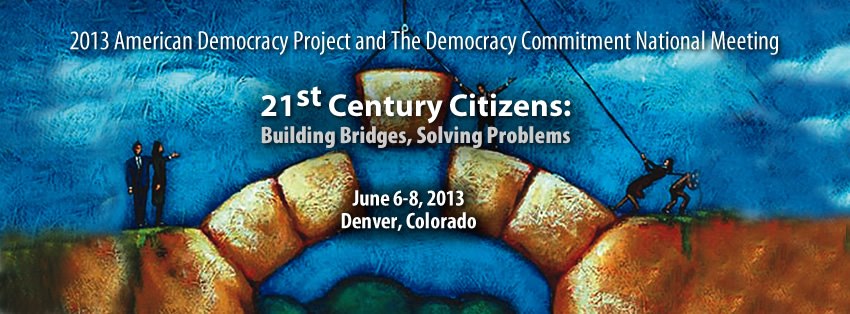
Thursday to Saturday •
June 6 - June 8, 2013
Marriott City Center • Denver, CO
Contact Us:
“21st Century Citizens: Building Bridges, Solving Problems”
Please join us in Denver, Colorado for the American Democracy Project’s (ADP) 11th annual national meeting and The Democracy Commitment’s (TDC) 3rd annual national meeting at the Marriott City Center. The meeting begins on Thursday, June 6 with a series of pre-conference workshops, a late afternoon opening plenary, and a wine and cheese reception; it concludes with a dinner Saturday evening, June 8.
About the Conference
The theme for this year’s meeting, 21st Century Citizens: Building Bridges, Solving Problems, calls our attention to the educational experiences and civic skills needed by today’s college graduates. Citizenship is more than a legal status; all students must be prepared to be active contributors in their communities. However, our institutions are increasingly called on to train students for specific jobs, rather than educating them more broadly with the knowledge, transferable intellectual and practical skills and sense of social responsibility in keeping with liberal arts education – one of the historic missions of U.S. public higher education. As our society grows increasingly complex, students need more than ever the broad preparation required to become informed, engaged citizens.
In order to prepare students to engage in our communities, students must be equipped with 21st century skills: working with others, critical thinking, communication, creativity and problem-solving, to name a few. Such skills are as valuable in the workforce as they are in our communities and are essential if we are to bridge existing gaps between learning and doing, intention and action. In fact, research and employer surveys indicate that citizenship skills are an important component of 21st century career skills (Battistoni and Longo, 2005; Kolb, 2011; Hart Research Associates, 2010). Employers seek graduates who can work collaboratively with people who are different from them; they want graduates ready to tackle complex problems in multi-disciplinary teams. The first step in problem solving and working with others is building bridges to understanding different perspectives; skills required not only in the workforce but needed even more in our fractured democracy.
The meeting theme poses the following set of questions:
- What educational experiences across disciplines and practices are best suited to help students develop 21st century skills?
- In what ways can the American Democracy Project and The Democracy Commitment work together to better prepare students in connecting their studies with the concrete problems facing our communities?
- How can we educate for both employment and civic engagement, leveraging the congruence between career and civic skills?
- How do we prepare students to be globally competent citizens in our increasingly complex, interdependent world?
- What knowledge, skills, attitudes and experiences do students need to be the informed, engaged citizens our democracy needs?
During our meeting in Denver, we will explore innovative ways in which to advance our civic work.
The 2013 meeting will be an outstanding program with more than 500 attendees, including provosts, other administrators, faculty members, students and community partners. The conference structure includes four plenary sessions, a set of featured speaker presentations, a poster session, a series of concurrent sessions, workshops, and lightning rounds, panels and roundtables with multiple presenters.


